Peace
Mission #1 to Japan:
March, 2002
Peace
Mission #2 to Japan: December 2002
Peace
Mission #3 to Japan: March 2004
Address of Steve
Freedkin,
Peace and Justice Commission,
City of Berkeley, California, USA,
to the Linking Peace and Life Conference,
Osaka, Japan, 17 March 2002
This
address was also delivered at activist meetings
March 18 in Tokyo; March 19 in Hiroshima; March 21 in Kyoto;
and March 23 in Kobe.
- Introduction
Hello. I am honored and grateful to be here, and I want to thank Linking
Peace and Life for inviting me and hosting me. I would like to particularly
thank Misao Inoue-san for his great help in preparing for this visit. I would
most especially like to thank all of you for coming here today, for caring
about these issues, and for working to make the world better. I come from
the United States, a culture that is a few hundred years old. Your culture
dates back several thousand years. So, I am quite humbled to be invited to
speak to you; I think perhaps you have much more to teach me than I can ever
tell you. I do plan to spend a lot of time listening during this trip.
Your country's experience with the atomic bombings in World War II makes
Japan a special repository of knowledge and wisdom that must be heard and
remembered. One reason I am here is to learn what you have to teach us about
ensuring that such a thing can never happen again.
While I cannot speak for my government or for every American,
I know I speak for many Americans when I express our desire
to help ensure that these terrible weapons will never be used again. I offer
sincere condolences and apologies for this tragedy.
- U.S. Reaction to September 11, 2001:
Why It Is Not Surprising
Let us turn now to the events of the past few weeks and months. The American
response to the attacks of September 11, 2001 was not unpredictable. A number
of factors help explain it. First, the U.S. has never experienced such an
attack on a civilian population -- and this one was seen in real time on TV.
It felt to us like an attack on members of our family, taking place in front
of our eyes. And we didn't know what was coming next. In the first hours after
the attacks, for example, I stored up a large supply of drinking water, not
knowing whether there would be more attacks, including perhaps the poisoning
of water supplies. We all felt immediately in danger. In many ways this experience
was unique for the whole world. The world has never seen a surprise terrorist
attack of this magnitude, from an unknown source, a non-national attacker.
It is natural for many of us to feel uncomfortable with ambiguity. We want
to know who is to blame, and we want a concrete, visible response that will
make us feel protected from future attacks. Some aspects of American culture,
and especially the news media, can lead us toward less informed, less thoughtful
responses. For example, America is a continent apart. Our distance from most
of the world has contributed to our lack of knowledge about other cultures.
We also are a consumer-oriented culture. Consumerism can encourage us to
seek quick solutions. Stock trading, television, video games, and the multitasking
lifestyle all train us to have shorter attention spans, making it more difficult
to have a long-term perspective.
The U.S. news media are an important part of how Americans understand what
is happening in the world. When considering how our country and its people
have responded to the events of September 11, I encourage you to keep in mind
the limited information to which most Americans have been exposed.
Most U.S. media are limited in their willingness and ability to investigate
and criticize the government, especially in war-like times. In my opinion,
this is not usually because of outright censorship; the U.S. Constitution
still generally prevents the government from directly censoring the media.
The ownership of news media by a few very large corporations has reduced the
quality of reporting. Increasingly, the corporate owners have interfered directly
with news operations. But even without any direct orders from the corporate
leaders, the quality of news coverage is being compromised. Officials of large
corporations hire editors who share their view of the world, which of course
supports the powerful interests of which they are part, and they hire reporters
who feel the same way. Also, many of these large corporations have reduced
the budgets for their news operations, in order to keep profits high, so reporters
lack the resources for serious investigation. All these factors lead to news
coverage that is increasingly superficial.
George W. Bush is surrounded by people who have learned a particular lesson
from the Vietnam war: That they would lose American public support if people
saw what really happens in war. So they have strictly limited what Americans
are able to see, by limiting reporters' access to the battlefields. We do
hear reports of casualties, including some civilian casualties, but the pictures
we see are not of these. Mostly, we see blurry, black-and-white images taken
by the military from cameras aboard their aircraft, showing little white boxes
on the ground that might be buildings or little dark boxes that
might be vehicles. When the bomb drops we see a quick little
flash, then the little box is gone. It looks very much like an image from
a video game. We never see the real people in those little grey-and-white
boxes.
There is very little coverage of how the Taliban and Al Qaida were supported
by the U.S. government in the past; how we may be making the same mistake
with the new forces ruling Afghanistan; how our foreign policy has contributed
to conditions that give rise to terrorism. There is almost no information
about alternative ways we could have dealt with this situation, such as through
United Nations action or nonviolent pressure.
There has always been a certain portion of American society that considers
it unpatriotic to criticize government policy. During this crisis, some of
us who are raising questions have been labeled un-American, or even called
terrorists ourselves. I appeared
on a national news program where the host actually said, "Berkeley is
not part of America." Some of our officials have even received death threats
for speaking out.
Given all of these factors -- the limited information most Americans have,
the short-term thinking that our consumer culture encourages, and the risk
of being called un-American if you do speak up -- perhaps it is understandable
that there has not yet been a bigger outcry in my country.
Some may find all this discouraging, but I don't. Here's why. It is
true that most polls show a large majority of Americans support the government's
so-called "war on terrorism." However, a great amount of that support is very
fragile, because it is based on limited information. In late September, John
Zogby, the director of the important Zogby
Poll, told
me, "I think that you will have a more measured and thoughtful response
as each day passes." He specifically said that support declines significantly
when people consider the possibility that innocent civilians may be killed.
And here is a point that may be very important for Japanese peace activists:
American public opinion is much
less willing to support a "war on terrorism" if U.S. allies don't also
support it. And fewer
than half of Americans support military action to remove Iraq's Saddam
Hussein if U.S. allies oppose such action. So, we must not underestimate the
power of information and of actions by other countries to change people's
minds in America.
It can be discouraging to think that at the height of the fear and anger,
93 percent of the American public supported military action. However,
keep in mind that the 7 percent in opposition amounts to 14 million people.
The anthropologist Margaret Mead once said,
"Never doubt that a small group of dedicated people can change the world.
Indeed, it's the only thing that ever has." Fourteen million opponents to
war, immediately after we've been attacked in a horrible way, is not a bad
start.
And there is some reason to think the number of Americans opposing this war
is actually much higher. The political humorist Michael
Moore wrote a book critical of the Bush Administration that was supposed
to come out on September 11. The publisher held the book for several months,
and finally announced it was going to cancel the book and destroy the 50,000
copies that had already been printed. However, hundreds of librarians wrote
to the publisher demanding that the book be released. Finally, the publisher
agreed, but told Michael Moore that the book would be a failure because the
country's mood had changed and nobody was interested in criticizing the government.
Well, the book is now the number one
or two best seller
in the country. The publisher has had to print more books every day.
So, let's not be so quick to believe that Americans are willing to follow
whatever the government says without question.
When the U.S. Congress voted to authorize an unending war against unspecified
enemies, only one member of Congress had the courage to say "no," and I am
very proud to live in the district represented by Barbara
Lee. But now, others are beginning to raise serious criticism. Representative
Dennis Kucinich of Ohio has written
a powerful essay
questioning this rush to military action, and Senator Tom
Daschle, the leader of the U.S. Senate, is raising
serious questions.
- Berkeley Speaks Out
Soon after the bombing of Afghanistan began, a member of the Berkeley City
Council, Dona Spring,
felt it was important to urge the U.S. government to end the bombing as soon
as possible. Of the nine city council members, five voted for this provision,
and the other four abstained. In the days following the vote there was a lot
of angry reaction. However, as time has gone on, more and more people have
expressed support. In particular, the delegations that have come from Japan
to express their appreciation for the resolution have been very important
in supporting our city's progressive council members, which is immensely helpful
to the Berkeley peace and justice community. For that, we say:
Domo arigato gozaimasu
(thank you very much).
Berkeley's
involvement in social issues has a long history. In 1950, radio station KPFA
was established by
Berkeley pacifists who felt it was important to have a community radio station
to help build a movement for world peace. That one station has grown to the
Pacifica radio network, whose programming
can now be heard in much of the country.
In the 1960s, the Free Speech Movement
created a climate of activism at the University
of California at Berkeley. During that same period, many people were drawn
to the San Francisco Bay Area for the political and cultural environment created
by the hippie movement.
Many of those activists are still in Berkeley today, and their children are
now becoming activists, too. This helps explain why our city is so involved
in national and international affairs, and why we have a community and government
structure that provides so many opportunities for citizen action -- including
the city's citizen commissions.
The Afghanistan resolution was initiated by the City Council, but other resolutions
regarding the so-called "war on terrorism" have been initiated by the Berkeley
Peace
and Justice Commission, on which I serve.
Berkeley has nearly 50 citizen commissions,
covering issues as diverse as city parks, the status of women, environment,
health, energy, and arts. By law,
the commissions must announce their meetings and agendas in advance. the meetings
must be open to the public, and must allow time for public comment.
Most commission members are appointed. For example, the Peace and Justice
Commission advises both the City Council and the School Board, so each school
board member and each city council member can appoint one Peace and Justice
commissioner. I was appointed by a school board member. (By the way, the person
who appointed me is a member of the Green Party, as is Dona Spring, the city
council member who authored the Afghanistan resolution.)
One commission, the Rent Stablization Board, is elected by the public, and
has authority to control the rents that may be charged for houses and apartments.
Other commissions that have some level of regulatory authority include the
Police Review Commission, which can investigate and recommend action on complaints
against police officers; the Planning Commission, which approves or disapproves
designs for new construction; and the Fair Campaign Practices Commission,
which enforces regulations controlling election campaigns.
The Peace and Justice Commission has some particular areas of responsibility.
Requests to establish Sister City relationships are evaluated by our commission,
which sends its recommendations to the City Council for decision. Berkeley
has several sister cities, including Sakai in Japan.
Another area of responsibility is regarding the Nuclear
Free Berkeley Act. This is a law that was passed by citizen initiative,
which means that it was written by citizens and placed on the ballot by petition,
and then a majority voted for it. The Nuclear Free Berkeley Act requires that
the City try to find suppliers for services and goods that are not nuclear
contractors. Our Commission is charged with reviewing all contracts between
the City and any organization involved in nuclear weapons, primarily the University
of California, which operates two nuclear weapons laboratories. We are to
make a recommendation regarding whether a contract should be accepted because
there is no reasonable alternative, or the City should try to find another
supplier that is not involved with nuclear weapons.
Sometimes proposals are initiated by the City Council and sent to us for
advice. This month we received a request from the City Council to provide
advice regarding the treatment of the group Falung Gong by the government
of China, including in our Sister City in that country. This proposal was
brought to a City Council member by a concerned citizen, and then was referred
to us. That citizen came to our meeting on March 13 and helped us with background
information and language for our recommendation.
Sometimes resolutions are initiated by our Commission members. For example,
several members of our Commission are interested in building peace and justice
in our own community by introducing conflict
resolution methods to community groups involved in controversial issues.
We may make proposals to the School Board and the City Council suggesting
methods for resolving local controversies in a more harmonious way.
We often receive input from community organizations. Some groups that have
provided proposals or comments recently are the Meiklejohn Civil Liberties
Institute, the Central Committee for Conscientious Objectors, the Ecumenical
Peace Institute, the Boy
Scouts, and Clergy and Laity Concerned. The Women's International League
for Peace and Freedom came to our meeting at the beginning of this month with
a proposal for saving the Anti-Ballistic Missile (ABM) Treaty and opposing
the National
Missile Defense program. I look forward to talking with members of Linking
Peace and Life about how we might work together on issues such as the participation
of the Hoya Glass Company
in supplying materials for the National
Ignition Facility in the Berkeley area, and the proposal of the
U.S. military to build a base that would infringe upon the habitat of the
dugong
off the shores of Okinawa.
The commission structure in Berkeley is rather unusual. Most communities
have temporary commissions that address particular issues and then dissolve,
but not many cities have such a structure of permanent citizen commissions.
This system gives Berkeley citizens many opportunities to help shape city
policy on local, national, and global matters.
- A Moment in History
I wish to conclude my remarks today with a reflection on happened to the
world in the days following September 11, 2001.
In our country we have an expression, "In every dark cloud there is a silver
lining." It means that every terrible event has within it the possibilities
to find something positive
Nobody would ever wish for a disaster to occur. However, just as Japan,
from the experience of the terrible bombings of World War 2, has created a
peace and justice movement that can help the world make a better future, the
tragic attacks of September 11 have had their own "silver lining."
Many bad things have happened since that day, and I do not wish to minimize
these. However, there have also been positive developments that might, in
the long term, prove to be extremely important.
First, let me tell you that there have been positive changes in American
culture since that day. Many people have come together with a new sense of
community. So many people donated blood that the blood banks became full,
and actually had to discard extra blood. So many people gave money for relief
of the attack victims that charities asked people to stop giving.
This spirit of unity was not only in America.
All through the world, the global community came together as one family in
the days following the tragic attacks.
In every part of the globe, people placed flowers* ...
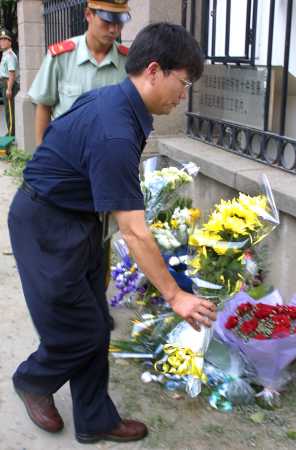
Beijing, China
... they lit candles ...
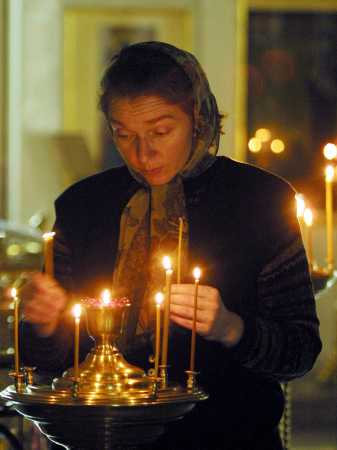
Moscow, Russia
... and they publicly expressed their condolences.
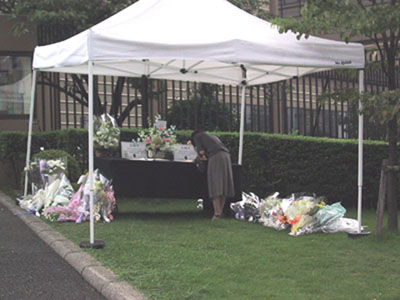
Signing condolence book, U.S. embassy, Tokyo
Almost every one of the world's leaders expressed concern and support ...

Flags at half-staff
over the Kremlin
... even those who have not been very close to the United States in the past.
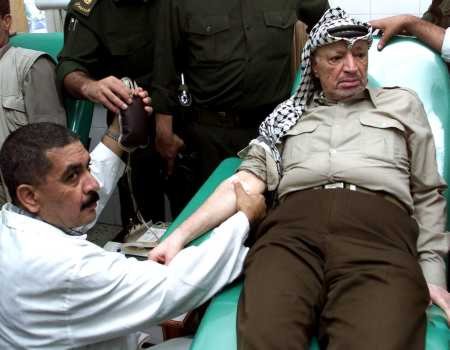
Yasser Arafat giving blood
But what is really interesting to me is not what the leaders said; it is
what the people did.



France, Argentina, Denmark (L-R)
We have never in history had a chance to witness almost the entire human
race coming together in shared mourning and solidarity.
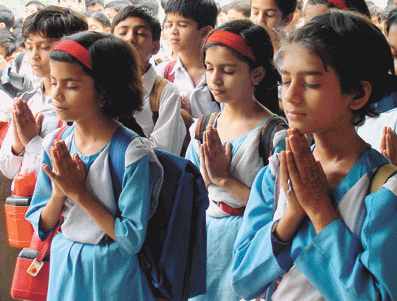
Children in Bhopal, India
In part, this is possible because we now have instant two-way communications
that enabled people almost everywhere to see what happened in New York ...
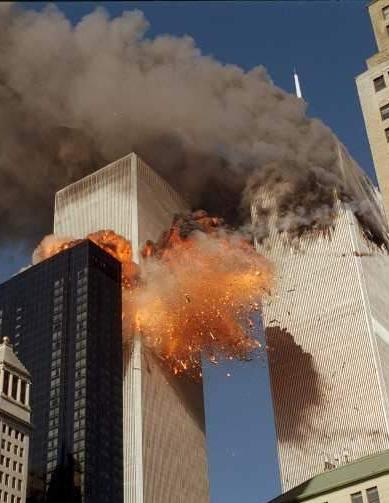
Crimes against humanity
... and enabled us to see their response.
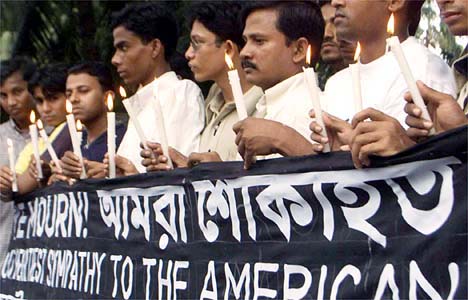
Dhaka,
Bangladesh
But to me, there is a deeper meaning.
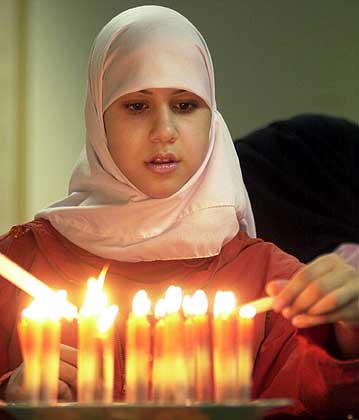
Muslim woman
During this time of global mourning and unity, leaders of certain organizations,
like Hamas in the Middle East, privately said they had to stop all terrorist
activities because the world opinion, the world feeling, was so strongly against
such actions.
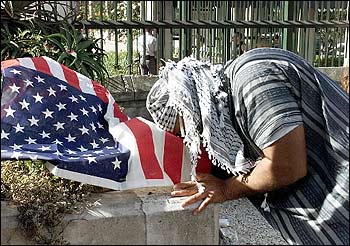
Lisbon, Portugal
In this way, the public ceremonies and statements became much more than symbolism.
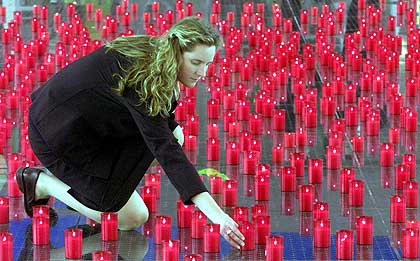
Wolfsburg,
Germany
The power of nonviolent expression, the power of global caring, actually,
concretely stopped the violence in part of the world for a time.

Munich, Germany
Yes, one can argue that a historic opportunity was lost when the United States
began bombing Afghanistan on October 7th. Yes, one can say the violence in
other parts of the world has resumed.
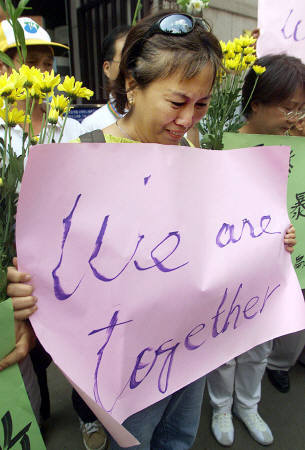
Taipei, Taiwan
But one can also say that the whole world got a glimpse of an entirely different
possibility: that nonviolent human expression could actually be an antidote
to global violence.
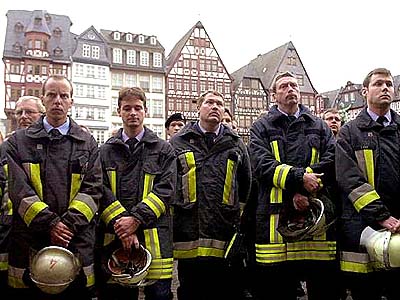
Frankfort,
Germany
Now that the world has seen this possibility, it can never again be hidden
completely from us.
The world may not be ready today, but someday it will be.

Belarus
India's Mahatma Gandhi once said, "The way of truth and love has always won.
There are tyrants, but in the end they always fall. ...
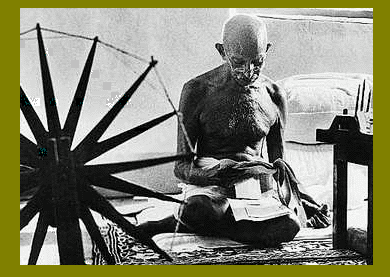
Mahatma ("great
soul") Mohandas K. Gandhi
... Think of it ... always."

http://www.progressiveportal.org/osaka/
*Some of the photographs on this page are different from those displayed during the original speech.
March 16: Osaka Arrival
| March 17: Conference
| March 18: Tokyo
| March 19: Hiroshima
Top
of This Page
![]()



















